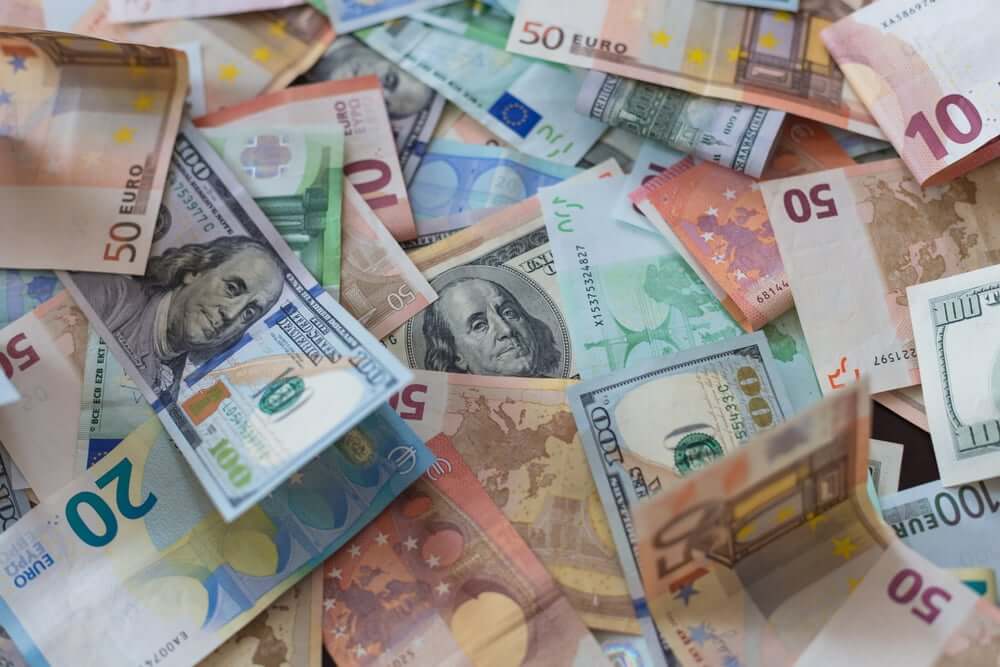
U.S. Dollar Firmed On Tuesday. What About The Sterling?
The greenback traded near its lowest level in seven months versus the euro today. Despite that, the currency was firmer compared to the previous session. Two U.S. Federal Reserve officials made hawkish comments overnight. That helped the dollar to recoup after trading in the deep red yesterday. Investors are now waiting for Fed chair Jerome Powell’s speech later on Tuesday.
The U.S. dollar index remained steady at 103.23 against a basket of six major currencies today. However, it shaved off 0.7% in the previous session, hitting a seven-month low of 102.93.
The greenback has been declining lately as the number of forex traders expecting the Fed to hike interest rates above 5% increases. The agency might have to do that to hinder the soaring inflation. But Fed’s aggressive rate increases last year weighed on the U.S. economy, and it could cause a recession.
According to the employment report released last week, the United States added new jobs at a solid clip last month. Still, it has also shown a slowdown in wage growth. Another report showed softer services activity. As a result, market participants think the agency will raise rates to their highest, just under 5%, by June, before lowering them later in the year.
Despite such expectations, Fed officials reiterate that rates must increase further and remain elevated. San Francisco Fed President Mary Daly and Atlanta Fed Bank President Raphael Bostic claimed as much on Monday.
What Do The Analysts Say?
Simon Harvey, the head of FX analysis at Monex Europe, noted that traders still realized some risk events were on the horizon. They had moved recklessly when they abandoned the dollar and moved on to riskier currencies. That’s why the greenback paused its fall today.
The analyst also added that U.S. CPI data is due on Thursday and will be as important as Fed chair Jerome Powell’s comments later today. According to Harvey, there is still a significant risk that U.S. inflation remains high and the Fed will have to maintain increased rates for longer.
Meanwhile, the euro exchanged hands at $1.0736. The common currency changed insignificantly on the day. It stood just below its seven-month peak of 1.07605 hit in the previous session. The British Pound also tumbled by 0.1% at $1.2165, trading below yesterday’s three-week high.
On Tuesday, the risk-sensitive Australian dollar plummeted by 0.4% to $0.68886. The Aussie also surged forward in the previous session, hitting a more than four-month peak of $0.6950. On the other hand, the offshore yuan sat at 6.7889 per USD at last. It skyrocketed to its highest level in five months, exchanging hands at 6.7590 earlier in the session.
China is rapidly reopening its borders. The country has lifted most of its pandemic restrictions, causing riskier assets and currencies to rally this week. China-linked currencies, such as the Aussie and Kiwi, gained the most. But others also profited thanks to the safe-haven U.S. dollar’s decline.
Another safe-haven, the Japanese Yen, continued falling today. The greenback climbed up by 0.2% to 132.2 yen. The Bank of Japan surprised markets by changing its yield curve policy late last year. Since that announcement, the yen has been broadly gaining, but it ended in the red yesterday.
What About The EM Currencies?
On Tuesday, Asian emerging market currencies and stocks declined as the U.S. dollar gained due to Fed officials’ hawkish remarks. However, the Indian rupee was an exception. It skyrocketed today, celebrating its biggest single-day gain in two months. The currency ended the session at 81.7850 per USD. Overall, it jumped by 0.71% today after closing at 82.36 on Monday.
On the other hand, MSCI’s index of emerging market stocks dropped by 0.1% after jumping by 6.2% during the last five consecutive sessions. Hungarian shares suffered the most in central Europe, tumbling by 0.5%. At the same time, South Africa’s main index plunged by 0.7% after surging to its highest peak in the previous session. However, Chinese blue chips and Taiwanese shares managed to show some gains.
Meantime, South Africa’s rand fell by 0.6%. Hungary’s forint also shaved off 0.3% against the euro on Tuesday. But the currencies of Poland and the Czech Republic soared. Brazil’s real lowered by 0.6% on Monday due to polarization and fiscal concerns. Supporters of far-right former president Jair Bolsonaro protested his election loss, invading government buildings. That has also caused investors to worry.


